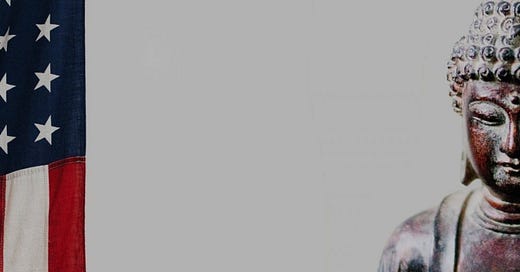We're in a war. Again.
Living, zen, politics, & taking responsibility for all of it.
Shortly after Dogen Zenji made it to China, he encountered an elderly Zen monk —in this case, the head cook, or tenzo, of a zen monastery — drying mushrooms under an unrelentingly hot sun. The work was hard, dirty, and hot, and the old monk had to support himself on a staff.
Dogen asked the monk why he was out in the hot sun, instead of a younger monk.
“I am in charge of this work,” said the monk. “How can I leave it to others?”
This exchange was the beginning of Dogen’s training in China, and it underlines maybe the most basic foundation of zen practice: ‘if not me, then who, and if not now, when?’
Zen practice, at its heart, is taking responsibility: responsibility for our circumstances, our interactions, our behavior — for our lives. How are we taking responsibility for our practice? For wherever we find ourselves, and for whomever we find ourselves with? What is the horizon line of my responsibility? Is there a line?
Dogen includes this story in his Tenzo Kyokun — Instructions for the Cook, in english. At the end of evening zazen, we recite the four Bodhisattva vows:
“Sentient beings are numberless, I vow to save them; delusions are inexhaustible, I vow to put an end to them; the Dharmas are boundless, I vow to master them; the Buddha Way is unattainable, I vow to attain it.”
The vows are manifestly impossible to achieve; Sentient Beings are numberless, I can never save them all. Delusions are inexhaustible, I cannot put an end to them. Dharmas are boundless; mastering them is, by definition, never going to happen. The Buddha Way — the practice of being awakened — is unattainable; again, literally — I cannot attain it.
So we’re vowing to take responsibility for all these things, for this world, with the implicit understanding that we can never achieve what we’ve set out to accomplish. That’s the whole point of the vow: we commit to taking full responsibility with the foundational understanding that we will never finish with our responsibility: the task itself is endless.
How do we take responsibility? In Instructions to the Cook, Dogen describes our lives as the ‘supreme meal,’ and the entire fascicle expresses the attention we take in preparing and cooking a meal as the actual expression of the care we take and attention we pay to our lives themselves.
“Handle even a single leaf of a green in such a way that it manifests the body of the buddha.”
What are the ingredients of our lives? Our circumstances. All our circumstances — every element of our lives is an ingredient. And the attention we pay to those ingredients: how we accept or reject them, how we choose to engage with those ingredients, is the expression itself of the awakened way. The responsibility we take for the entirety of this world, in every moment, in every step, in every breath.
What is the horizon of our responsibility?
The earth revolves; the horizon recedes as we approach it. Our responsibility encompasses whatever we see and touch as that line dissolves ahead of us on the path.
How can our responsibility — ever — be limited? Does it end at the edge of my meditation cushion? At the door to the zendo? At my front door? The borders of my village, town, city, state, nation?
To whom do we owe responsibility? Ourselves, our families, our neighbors, our communities? Does that vow end with the citizens of the United States? Ukraine? Gaza? Iran?
Practice with all those ingredients. Act accordingly. It’s our responsibility, and no one else’s.
Your comments are always welcomed and encouraged. I’d love to hear from you.
One more thing.
As a zen priest I’m a student of Tenshin Fletcher Roshi at Yokoji Zen Mountain Center. For more info on Yokoji, please visit www.zmc.org.
I’m also the caretaker of Warwick Zendo, a small in-person and online sangha based in the lower Hudson Valley of New York. if you’d like to check out our practice community, we’re at www.warwickzen.org.
How this works.
I plan to post at least once a week, at minimum. The Freeside offers those weekly posts, which will always be accessible. Payside will (eventually) offer access to some longer writing and ongoing investigations into my practice: literary, baking, road. All of it fundamentally zen.
Payside also helps to sustain this project, and this practice. Like any creative project, keep sweeping is a kind of labor, and as such, your support to sustain that labor is much appreciated.
If Payside is not for you, that’s all good. The posts will keep coming on Freeside. The support of your reading and attention is a deeply appreciated gift, and I thank you for being here.
You won’t have to worry about missing anything. Every new edition of the newsletter goes directly to your inbox.



